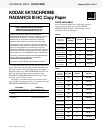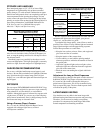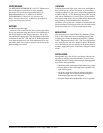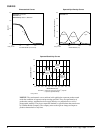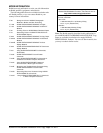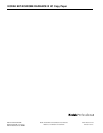
KODAK EKTACHROME RADIANCE III HC Copy Paper • E-2411 3
PROCESSING
Use KODAK EKTACHROME R-3 or R-3 LU Chemicals to
process this paper in continuous or roller-transport
processors. For specific processing instructions, see
KODAK Publication No. Z-129B, Using KODAK
EKTACHROME R-3 Chemicals in Continuous and
Roller-Transport Processors, available on our website at
www.kodak.com/go/professional.
DRYING
Do not ferrotype this paper.
Remove excess water from the surface of the paper before
drying. Dry the prints using dust-free air. The temperature of
the air will depend on the design of the dryer, the air-flow
rate, and the total drying time. The ideal drying temperature
is between 50 and 70°C (122 and 158°F). If the temperature
is too high, the paper may curl. If the temperature is too low,
the surface gloss of the paper is reduced, and the risk of the
paper sticking is increased.
VIEWING
Evaluate prints under light of the same color and brightness
that you will use to view the final prints. A good average
viewing condition is a light source with a color temperature
of 4000 ±1000 K, a Color Rendering Index (CRI) of 85 to
100, and an illuminance of a least 538 lux (50 footcandles).
Fluorescent lamps such as the cool white deluxe fluorescent
lamp (made by several manufacturers) meet these
conditions. You can also use a mixture of incandescent and
fluorescent lamps. For each pair of 40-watt cool white deluxe
fluorescent lamps, use a 75-watt frosted tungsen bulb.
MOUNTING
You can mount prints with KODAK Dry Mounting Tissue,
Type 2. The temperature across the heating platen of the
mounting press should be between 82 and 99°C (180 and
210°F). Temperatures above 110°C (230°F) or high pressure
may cause physical and color changes in prints. Preheat the
cover sheet that you use over the face of the print to remove
moisture. Apply pressure for 30 seconds or longer for a thick
mount.
DISPLAYING
Photographic dyes, like all dyes, can change with time and
exposure to sunlight, ultraviolet radiation, excessive heat,
and high humidity. To help prevent changes in photographic
dyes, follow these guidelines:
• Illuminate prints with tungsten light whenever possible.
• Display prints in the lowest light level consistent with
your viewing needs.
• If a print is exposed to direct or indirect sunlight or
fluorescent light, use an ultraviolet-absorbing filter
between the light source and the print.
• Keep the temperature and humidity as low as possible.
From cpotter@node1 Thu Dec 12 17:18:27 1996
Date: Thu, 12 Dec 96 17:21:57 EST
From: cpotter@node1 (Chris Potter)
To: dpen azek@caps
Subject: Illustration Update
inns:
any



